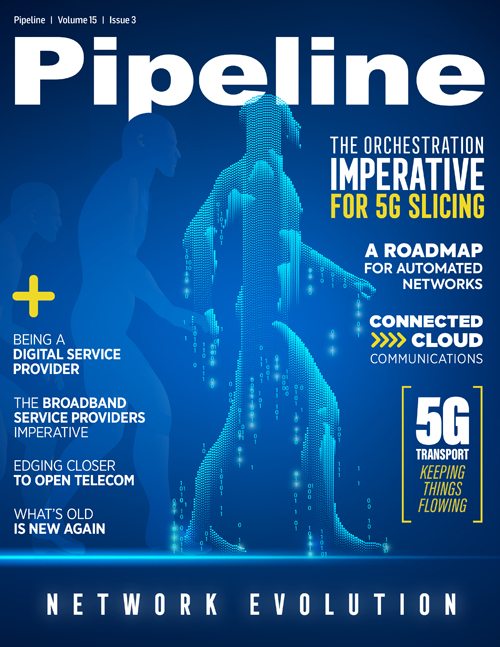MEF 3.0 - A Roadmap for Enabling Assured Services over Automated Networks
- MEF 3.0 CE. In May, MEF enhanced the family of current MEF 3.0 CE services by publishing a specification (MEF 62) that defines a new Managed Access E-Line Service with a specific set of management and Class of Service capabilities designed to accelerate service provisioning and simplify management of services that traverse multiple operators.
- MEF 3.0 Optical Transport. In August, MEF published our first Optical Transport Services specification (MEF 63) for subscriber services that support Ethernet and Fiber Channel client protocols as well as SONET/SDH client protocols for legacy WAN services. This specification paves the way for service providers to automate multi-vendor service offerings.
- MEF 3.0 IP. In April, MEF published the Subscriber IP Service Attributes Technical Specification (MEF 61) as the first in a planned series of IP specs to describe subscriber and operator IP services. This is an important step toward our goal of enabling orchestrated IP services.
- MEF 3.0 SD-WAN. In a landmark development, we are moving close to publishing the industry’s first standard for defining an SD-WAN service and associated service attributes by the end of this year.
Open LSO APIs. MEF’s LSO Reference Architecture guides development of standardized LSO APIs for end-to-end service orchestration across multiple providers and over multiple network technology domains. MEF has ongoing work related to multiple LSO interface reference points supported by dozens of companies, but I want to draw attention to API development associated with two key reference points:
- LSO Sonata. All eyes have been focused on development of inter-provider LSO Sonata APIs that deal with business and operations interactions between connectivity providers. MEF is on track to soon release a set of LSO Sonata APIs related to serviceability, product inventory, quoting, ordering, and trouble ticketing. MEF also is moving closer to publishing a spec that identifies LSO Sonata operations that will benefit from commercial billing and settlement APIs. As Mirko Voltolini, Global Head of Network on Demand, Colt explained, once MEF-defined LSO Sonata APIs are released “there will be a common language that everybody can use to set up, interconnect, and orchestrate network services across multiple different carrier networks.”
- LSO Presto. MEF has released two specifications that advance intra-provider orchestration of MEF 3.0 services over multiple network technology domains: the Network Resource Management: Information Model (MEF 59) and the Network Resource Provisioning: Interface Profile Specification (MEF 60). As a result, the LSO Presto API for automated network resource provisioning is now available for standardized use with a mix of network technologies.
You might ask yourself: how important is it that standardized LSO APIs be adopted? Consider the following view expressed by a lead network architect involved in the standardization effort: Without open APIs, each carrier is forced to integrate with every other carrier’s APIs if they wish to automate processes. Similarly, without open APIs, each carrier is forced to integrate with every technology vendor’s APIs, or each vendor must implement each carrier’s proprietary APIs. This lack of API interoperability creates a mesh of APIs, each of which requires software lifecycle management and is costly to carriers.
Proof of Concept (PoC) demonstrations. Less than 12 months after the MEF 3.0 launch, dozens of service providers and technology vendors will be collaborating in 20 PoC demonstrations at MEF18. The PoCs fall into five broad categories and exemplify the many aspects of MEF 3.0 services and the transformation required to deliver them successfully: service fulfillment and activation, service assurance, multilayer service, SD-WAN, universal CPE, and automated commercial interaction (including the use of blockchain technology).
With the MEF18 PoCs, there is a clear drive towards using LSO APIs to maximize interoperability between different operators as well between different technology vendors to achieve best-of-breed solutions in a fluid and evolving market and technology environment.
Service, Technology & Professional Certification. In July, MEF recognized the first three companies in the world to achieve MEF 3.0 certification: Ciena, H3C, and CMC Telecom of Vietnam. We look forward to recognizing more MEF 3.0-certified companies in the coming months. Meanwhile, we have expanded our professional certification program to include MEF-SDN/NFV and MEF Network Foundation certifications in addition to the popular MEF Carrier Ethernet Certified Professional (MEF-CECP) certification.
This brief update illustrates how a large number of service providers and vendors are rapidly adopting and demonstrating the MEF 3.0 framework. This is only the beginning of the transformation underway in the service provider market. I encourage you to join MEF on this exciting journey to reshape the communications landscape!



















